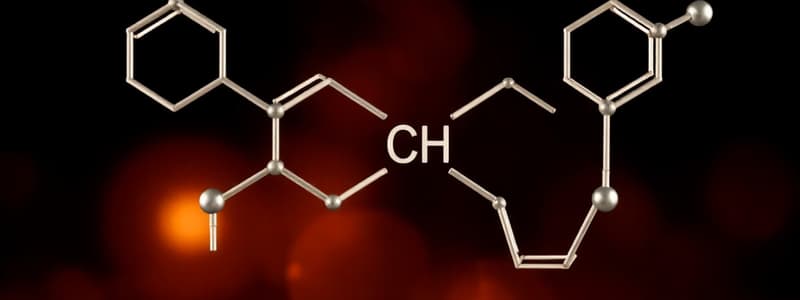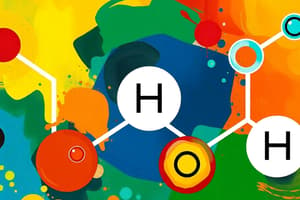Podcast
Questions and Answers
What is the primary focus of organic chemistry?
What is the primary focus of organic chemistry?
- The study of inorganic compounds
- The study of non-carbon based molecules
- The study of metals and their properties
- The study of carbon-containing compounds (correct)
Which of the following is an example of a functional group?
Which of the following is an example of a functional group?
- Alkane
- -COOH (correct)
- Alkyl Halide
- Hydrocarbon
Which reaction type involves the formation of a single product from two or more reactants?
Which reaction type involves the formation of a single product from two or more reactants?
- Addition Reaction (correct)
- Elimination Reaction
- Decomposition Reaction
- Substitution Reaction
What distinguishes aliphatic compounds in organic chemistry?
What distinguishes aliphatic compounds in organic chemistry?
How are alkyl halides named in relation to alkanes?
How are alkyl halides named in relation to alkanes?
What is the key characteristic of aryl halides?
What is the key characteristic of aryl halides?
Which of the following describes the nucleophilic substitution reaction?
Which of the following describes the nucleophilic substitution reaction?
What is a significant safety consideration regarding halogen derivatives?
What is a significant safety consideration regarding halogen derivatives?
Flashcards are hidden until you start studying
Study Notes
Organic Chemistry
- Definition: Study of carbon-containing compounds and their properties, structures, reactions, and synthesis.
- Key Concepts:
- Functional Groups: Specific groups of atoms that determine the chemical properties of compounds (e.g., -OH, -COOH, -NH2).
- Isomerism: Compounds with the same molecular formula but different structures (e.g., structural isomers, stereoisomers).
- Reactions:
- Addition Reactions: Two or more reactants form a single product (e.g., alkenes + H2).
- Elimination Reactions: Removal of a small molecule from a larger one (e.g., dehydration of alcohols).
- Substitution Reactions: One atom or group is replaced by another (e.g., alkyl halides).
- Types of Organic Compounds:
- Aliphatic Compounds: Non-aromatic hydrocarbons, including alkanes, alkenes, and alkynes.
- Aromatic Compounds: Compounds containing benzene rings with delocalized pi electrons.
Halogen Derivatives
-
Definition: Organic compounds containing halogen atoms (F, Cl, Br, I) replacing hydrogen in hydrocarbons.
-
Types:
- Alkyl Halides: Halogen attached to an alkane (e.g., chloroethane).
- Aryl Halides: Halogen attached to an aromatic ring (e.g., bromobenzene).
-
Nomenclature:
- Named similarly to alkanes but with halogen prefixes (e.g., chloro-, bromo-, iodo-).
- The longest carbon chain is identified, and the halogen substituents are numbered and named accordingly.
-
Physical Properties:
- Vary based on the type of halogen and the carbon chain length.
- Generally have higher boiling points than their alkane counterparts due to increased molecular weight and polarizability.
-
Reactions:
- Nucleophilic Substitution: Halogen can be replaced by a nucleophile (e.g., SN1 and SN2 mechanisms).
- Elimination Reactions: Halogens can be eliminated to form double or triple bonds (e.g., dehydrohalogenation).
- Reduction Reactions: Halogen derivatives can be converted to alkanes (e.g., reduction of alkyl halides).
-
Applications:
- Used in solvents, pharmaceuticals, and as intermediates in organic synthesis.
-
Safety:
- Many halogenated compounds can be toxic or harmful to the environment; proper handling and disposal are essential.
Organic Chemistry
- The study of carbon-containing compounds including their properties, structures, reactions, and synthesis
- Functional groups, specific groups of atoms within molecules, determine chemical properties
- Isomerism occurs when compounds have the same molecular formula but different structures, such as structural and stereoisomers
- Addition Reactions combine reactants to form one product, like adding hydrogen to alkenes
- Elimination Reactions remove small molecules from larger ones, like dehydration of alcohols
- Substitution Reactions replace one atom or group with another, such as alkyl halides
- Aliphatic Compounds are non-aromatic hydrocarbons including alkanes, alkenes, and alkynes
- Aromatic Compounds contain benzene rings with delocalized pi electrons
Halogen Derivatives
- Organic compounds containing halogen atoms (F, Cl, Br, I) in place of hydrogen within hydrocarbons
- Alkyl Halides have a halogen attached to an alkane, for example, chloroethane
- Aryl Halides have a halogen attached to an aromatic ring, for example, bromobenzene
- Halogen derivatives are named using prefixes like chloro-, bromo-, iodo-
- Physical properties vary based on the type of halogen and the number of carbons in the chain
- Halogens increase molecular weight which increases boiling points due to increased polarizability
- Nucleophilic Substitution reactions replace a halogen with a nucleophile using SN1 or SN2 mechanisms
- Elimination Reactions remove halogens to create double or triple bonds, for example, dehydrohalogenation
- Reduction Reactions transform halogen derivatives to alkanes, like reducing alkyl halides
- Halogenated compounds are used in solvents, pharmaceuticals, and as intermediates in organic synthesis
- Safety: Many halogenated compounds can be toxic and harmful to the environment, proper handling and disposal are essential
Studying That Suits You
Use AI to generate personalized quizzes and flashcards to suit your learning preferences.




